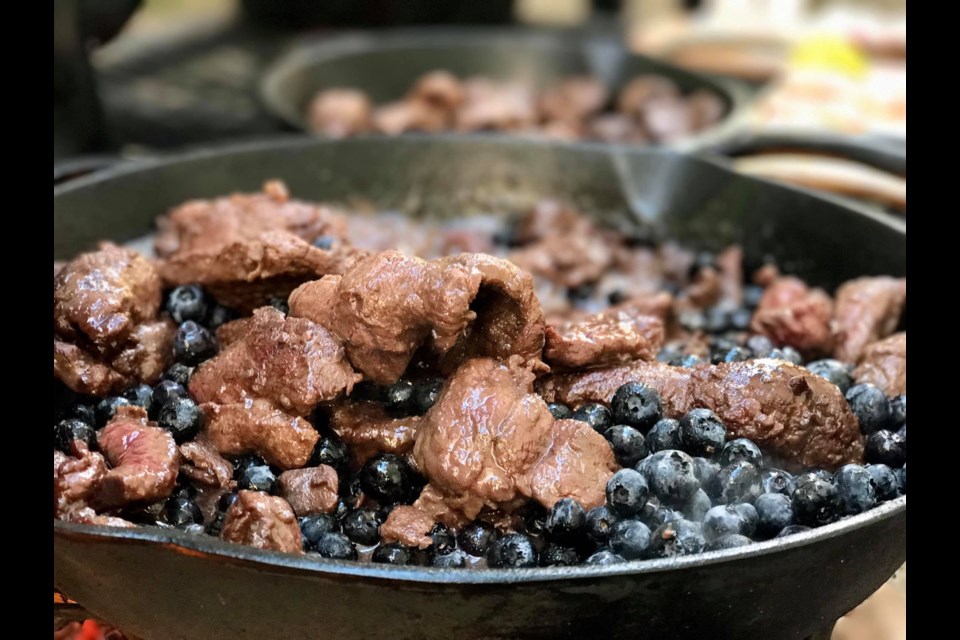From the fish, moose, vegetables, geese, berries, herbs they hunt, gather, forage, cook, and eat together as families. Even the wood they use to cook with is harvest year-round. While it is a lot of work, they place great importance on family dinners and eating country food from the land and water.
"Great Lakes Cultural Camps (GLCC) is an Anishinaabe family-owned business that has been the cornerstone of land-based education and learning in Northern Ontario for over ten years," said Maheengun Shawanda, GLCC director and founder, in an email interview. "It is a unique gathering place for community, culture and hands-on learning."
"Anishinaabe people have a natural relationship with the land, water, plants, animals, and with each other. Great Lakes Cultural Camps is dedicated to strengthen our traditional knowledge, life skills on the land, cultural revitalization, implementing and acting on the recommendations of the Truth and Reconciliation Commission of Canada (TRC): Calls To Action, and preserving the area’s incredible natural environment for future generations."
Camp specialties might include such things as working with the food of our ancestors, bushcraft or Anishinaabe wilderness skills, among others. Depending on the experience participants choose, one of the passionate Anishinaabe guides may take you to visit an Anishinaabe sugar bush, traditional fish camp, hide tanning camp, carving or weaving demonstrations, or even to learn about Chi-Gete-Anishinaabe Kendaasowin (ancestral knowledge).
Three months post-pandemic, they were tasked with planning new ways of delivering content gradually, safely and responsibly for the short term. "We have developed a COVID-19 action response plan and adapted procedures – COVID-19 precautions that include how we’ll be working with our guests and communities," explained Shawanda.
"We realize that your summer and our summer may look a little different. Due to physical distancing requirements across the country, we have created a virtual Niibin Anishinaabe Naadizowin Gbeshiwin (Anishinaabe Summer Cultural Camp) option for the summer of 2020 instead of in-person camps."
On June 20 a Virtual Intertribal Food Summit was held. It was hosted by the Intertribal Agriculture Council (IAC) in partnership with the Native American Food Sovereignty Alliance (NASFA), the University of Arkansas' Indigenous Food and Agriculture Initiative (IFAI) as well as two regional partners – the Wisconsin Tribal Conservation Advisory Council (WTCAC) and Michigan State University Extension.
"It was a huge learning curve to get in front of a camera, edit, and coordinate virtually. We felt we did our best to pull together for a strong presentation and had fun. After a few failed attempts and with the support of a few friends in the tepee, we calmed our nerves and we think we succeeded. Our first presentation was We Hunt, Cook, and Eat Together as a Family," said Shawanda.
Those involved in We Hunt, Cook, and Eat Together as a Family presentation were Bernadette Shawanda, Naakwam Shawanda, Phil Jones, Jessica Buldoc, and Maheengun Shawanda (audio).
"The concept of ezhi-ngod-weyaangizing (family) is central to Anishinaabe social structure. Ezhi-ngod-weyaangizing refers to family and extended family. The ezhi-ngod-weyaangizing is a member of a doodem (clan), which is a member of an dibendaagozing (tribe)."
"This concept is a culmination of Anishinaabe customs and traditions. It provides insight into who we are and where we come from. It gives us a strong sense of identity and sense of belonging. In Anishinaabe culture, family units go beyond the common sense notion of family living together in one house. Even in modern society it is not uncommon to have three generations of family under one roof. Families are extensive networks of strong, connective kinship which is at the core of tribal society. Family is extended family.
"An Anishinaabe who subsistence hunts, fishes, traps, gathers, gardens, shares and lives by cultural harvesting practices cherishes the land and water. It is our cultural responsibility to introduce these practices to future generations. It is important to us as a family to introduce where our ancestral foods come from, how to prepare them, and Anishinaabe harvesting protocols. Working towards living a subsistence life includes harvesting food for self, family, elders, community and for ceremonial purposes," explained Shawanda.
It is quite normal for a family grouping to collectively garden as a whole. Unable to access their family gardens across the river in Sault, Mich. since the onset of the pandemic, the Shawandas' took it upon themselves to start a garden at their home this year.
"For anyone who may be interested in learning more about Indigenous food sovereignty and food security taking place across Turtle Island (North America), check out the 2020 Virtual Intertribal Food Summit extensive collection of live recordings and on-demand sessions at: https://intertribal-agriculture-council.mn.co It is a wonderful opportunity to learn about the connection to the land and the role it plays in our relationship with our food and culture."
"A cultural camp experience is guaranteed to be out of the ordinary; it is intimate, relaxed, and educational. Our hands-on real life cultural experiences are geared to the abilities and interests of our guests. We offer something for everyone and programs can be made accessible to a variety of levels of physical ability. Everyone is welcome and we offer instruction to all ages."
For more information contact GLCC here.



